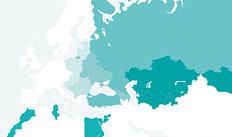Chapter 1
Perceived impartiality
In many of the countries reviewed a lack of judicial impartiality is seen as the major problem affecting the courts, whether in the form of corruption, lack of independence from the executive, or improper influences on judges from powerful individuals in business or government. Impartiality is a difficult dimension to measure in any categorical way, but reasonable inferences can be drawn from reviewing judicial decisions. The assessment results concluded that decisions reviewed displayed a moderate level of apparent impartiality, although scores varied considerably (see Chart A.1.2.8).
Source: The EBRD Judicial Decisions Assessment.
Note: The chart depicts the average scores given to perceived impartiality in the decisions reviewed, as assessed by local commercial law experts and a regional panel. The maximum score is 5, which represents a high standard of impartiality.
One of the main themes was an inference of court bias in favour of the state, either as a litigant in a commercial matter or as a regulator. In many decisions there appeared to be a discernible disposition towards arguments led by the state, particularly in cases involving challenges to the privatisation of state property. Courts did not always apply the same rigour and scrutiny to the arguments of state parties as they did to those of non-state litigants. For example, in a case in Moldova the court did not query the procurator's role in re-opening a privatisation transaction, when in fact the law required any challenge to be brought by the relevant state entity rather than the procurator, and there was no discussion of this issue in the judgment. Also, in Ukraine an appeal court heard and determined in the state's favour an apparently trivial matter within three weeks of the original decision, while other cases had been awaiting a hearing for many months. Such apparent special treatment, combined with the poor quality of the judgments concerned, gave rise to inferences of partiality.
The extent of perceived bias in favour of the state varied. The state did not always win. Of 75 selected decisions in which the state or a public body was a litigant, the state was successful on 52 occasions. In cases involving regulators the perceived bias in favour of the state was generally not much worse than other forms of partiality inferred in the judgments reviewed. Only in the Kyrgyz Republic and Uzbekistan did decisions on disputes with regulators attract significantly worse scores for impartiality than other decisions. Nevertheless, in cases involving political and substantial economic interests, particularly privatisations or in strategic sectors such as oil and gas, courts were considered to have a much more pronounced pro-state outlook.
The experts identified various factors contributing to judges' perceived bias in some of the cases reviewed. One was the practice whereby judges are appointed for an initial term of five years but are not guaranteed re-appointment, creating a perception that they will be wary of handing down too many decisions against government interests. Also, low judicial salaries, particularly in early transition countries, were considered to make judges vulnerable to improper influence. In some countries bribes were commonly believed to have been paid to obtain judicial postings, which appointees would then seek to recoup once on the bench.
Another factor was the absence in some countries of clear prohibitions on communications between an interested party (private or public) and a judge. In contrast, Georgian law expressly prohibits such communications prior to the court's judgment entering into force, and penalties for breach of these rules have been increased substantially. Many local lawyers believe that the bribing of judges has been all but eliminated in Georgia. This is consistent with broader public opinion gauged in the EBRD/World Bank 2010 Life in Transition Survey, which found that the level of perceived corruption in Georgia was as low as that in western European countries.







